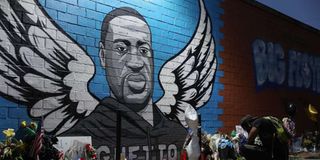Whether celebrities or not, black people in UK still having it rough

A memorial and mural that honours George Floyd at the Scott Food Mart corner store in Houston's Third Ward where Floyd grew up.
What you need to know:
- The death in May of a black man, George Floyd, in Minneapolis, USA, when a policeman knelt on his neck caused outrage here.
- The current coronavirus pandemic has also highlighted the divide between black and white in Britain, with the risk of dying from the virus higher among ethnic groups.
They were a black couple driving a luxury Mercedes. Next thing, they were pulled over by police and told to get out of the car and leave their three-month-old child on the back seat.
Such an incident might have gone unnoticed except that the woman in the car was Bianca Williams, a British star sprinter and gold medal winner at the European and Commonwealth Games. The driver was her partner Ricardo dos Santos, a Portuguese 400-metre runner.
On a mobile phone clip, Bianca can be heard crying hysterically for her baby boy, with a uniformed officer, apparently holding a baton and a policewoman peering through the car’s open door.
The police said the car was stopped in Maida Vale, London, because it was acting suspiciously and because there had been an increase in youth violence in the area, claims that were rejected by Bianca.
NICE CAR
In an interview with the BBC, she said; “They see a black male driving a nice car, an all-black car, and they assume that he is involved in some sort of gang, drug, violence problem.”
She called the incident “an awful experience” and said that “to witness my partner being taken away and for me to be taken away from my son, my heart hurts.”
Santos said he had been stopped in the car by police “about twenty times.”
Bianca said she was considering legal action and police bosses said they wanted to talk to her about her concerns.
The incident received front-page treatment at a time when race relations in Britain are receiving wide attention. The death in May of a black man, George Floyd, in Minneapolis, USA, when a policeman knelt on his neck caused outrage here.
Campaigners for the Black Lives Matter movement have torn down or defaced statues of British colonial figures seen as racists or slave traders, while “taking the knee” at sports events has become a regular tribute to non-white victims of racial prejudice.
CORONAVIRUS PANDEMIC
The current coronavirus pandemic has also highlighted the divide between black and white in Britain, with the risk of dying from the virus higher among ethnic groups.
Figures issued by the Office for National Statistics show that black men are 3.3 times more likely to die from Covid-19 than white men, while black women are 2.4 times higher. People of Indian, Pakistani and Bangladeshi ethnicities are also at higher risk.
The differential is attributed to higher risk groups having underlying health problems or living in deprived areas.
There is also a belief that historical racism and discrimination may make non-white people less likely to seek care when needed.
Alas, the perception of non-whites as somehow lesser people is not new in Britain – see the following item.
* * *
Star footballer Jack Leslie was taken aside by Bob Jack, the manager of his team, Plymouth Argyle, and given the thrilling news that he had been selected to play for England.
But when the team to face Ireland was published a few days later, another player was in the starting line-up and Leslie was named as a reserve.
That was 1925 and Leslie, born in London to an English mother and a Jamaican father, never did play for England, despite his extraordinary gifts.
BLACK PROFESSIONALS
His grand-daughter, Lesley Hiscott said last week, “I believe the Plymouth manager sent in a request saying, ‘I’ve got a brilliant player here, he should play for England.’
“So someone came down to watch him. They weren’t watching his football. They were looking at the colour of his skin. And because of that, he was denied the chance of playing for his country.”
It was 53 years before the first black player, Viv Anderson of West Bromwich Albion, turned out for England, but by the time Jack Leslie died, in 1988 at the age of 88, many black professionals had appeared in an English shirt.
A campaign has been launched to erect a statue of Leslie. The organiser, Greg Foxsmith, said, “At a time when some statues are being pulled down, we want to see one put up to mark Jack Leslie’s amazing achievements and remember the injustice that he suffered.”
* * *
Spotted on social media, a cry from the heart: “Education is important, but opening pubs is importanter.”




